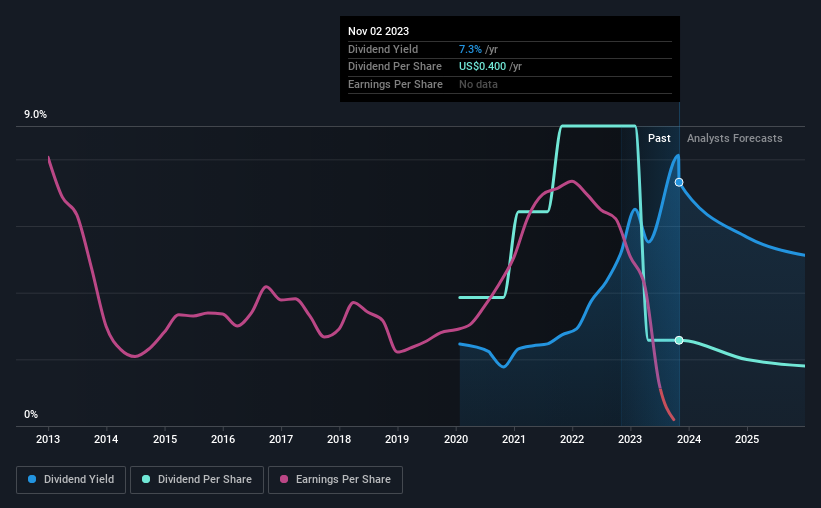Just Three Days Till HomeStreet, Inc. (NASDAQ:HMST) Will Be Trading Ex-Dividend
Some investors rely on dividends for growing their wealth, and if you're one of those dividend sleuths, you might be intrigued to know that HomeStreet, Inc. (NASDAQ:HMST) is about to go ex-dividend in just three days. Typically, the ex-dividend date is one business day before the record date which is the date on which a company determines the shareholders eligible to receive a dividend. It is important to be aware of the ex-dividend date because any trade on the stock needs to have been settled on or before the record date. Meaning, you will need to purchase HomeStreet's shares before the 7th of November to receive the dividend, which will be paid on the 22nd of November.
The company's next dividend payment will be US$0.10 per share. Last year, in total, the company distributed US$0.40 to shareholders. Based on the last year's worth of payments, HomeStreet stock has a trailing yield of around 7.3% on the current share price of $5.47. If you buy this business for its dividend, you should have an idea of whether HomeStreet's dividend is reliable and sustainable. As a result, readers should always check whether HomeStreet has been able to grow its dividends, or if the dividend might be cut.
Check out our latest analysis for HomeStreet
Dividends are typically paid out of company income, so if a company pays out more than it earned, its dividend is usually at a higher risk of being cut. HomeStreet paid a dividend last year despite being unprofitable. This might be a one-off event, but it's not a sustainable state of affairs in the long run.
Click here to see the company's payout ratio, plus analyst estimates of its future dividends.
Have Earnings And Dividends Been Growing?
Stocks in companies that generate sustainable earnings growth often make the best dividend prospects, as it is easier to lift the dividend when earnings are rising. If earnings fall far enough, the company could be forced to cut its dividend. HomeStreet was unprofitable last year, but at least the general trend suggests its earnings have been improving over the past five years. Even so, an unprofitable company whose business does not quickly recover is usually not a good candidate for dividend investors.
Another key way to measure a company's dividend prospects is by measuring its historical rate of dividend growth. HomeStreet's dividend payments per share have declined at 9.6% per year on average over the past four years, which is uninspiring.
We update our analysis on HomeStreet every 24 hours, so you can always get the latest insights on its financial health, here.
The Bottom Line
Is HomeStreet worth buying for its dividend? We're uncomfortable with the fact that HomeStreet paid a dividend while being loss-making. It might be worth researching if the company is reinvesting in growth projects that could grow earnings and dividends in the future, but for now we're on the fence about its dividend prospects.
If you want to look further into HomeStreet, it's worth knowing the risks this business faces. Our analysis shows 2 warning signs for HomeStreet and you should be aware of these before buying any shares.
If you're in the market for strong dividend payers, we recommend checking our selection of top dividend stocks.
Have feedback on this article? Concerned about the content? Get in touch with us directly. Alternatively, email editorial-team (at) simplywallst.com.
This article by Simply Wall St is general in nature. We provide commentary based on historical data and analyst forecasts only using an unbiased methodology and our articles are not intended to be financial advice. It does not constitute a recommendation to buy or sell any stock, and does not take account of your objectives, or your financial situation. We aim to bring you long-term focused analysis driven by fundamental data. Note that our analysis may not factor in the latest price-sensitive company announcements or qualitative material. Simply Wall St has no position in any stocks mentioned.

